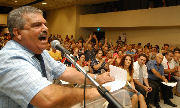
Democracy was left speechless yesterday as unruly behaviour from some Marsascala residents greeted the representatives of
Waste Serv, the Government's waste management company that is proposing a re-development of the
Sant'Antnin Recycling Plant.
In a customary public consultation meeting that is held by
MEPA - Malta's planning authority - each time a large-scale development is proposed, an unruly crowd booed and jeered as WasteServ representative Chris Ciantar tried to explain the proposed development that is estimated to cost EUR16.7 million. The three-hour long meeting was held to give anyone the opportunity to voice his concern on the proposed project. It was turned instead into what resembled more of a 'curva' in an Italian stadium with scores of hooligans trying to take over the meeting.
The meeting, which was held at the
Corinthia Jerma Palace Hotel, witnessed the presence of more than 300 angry residents but no Nationalist MPs and councillors. They made their voice - and sounds - heard as Ing. Chris Ciantar of WasteServ tried to explain to the public what is the proposed project. The crowd showed placards carrying messages against the recycling plant which has already generated a lot of inconvenience amongst residents since it was opened in 1993 as Ing. Ciantar tried to explain that the whole project was going to improve the whole situation.
Ciantar, who is WasteServ's Head of Strategy and Development said how the proposed plant will have a capacity of 71,000 tons of waste while the current plant has a capacity of 80,000 tons but is currently processing around 40,000 tons of waste due to some inefficiencies. He said that the EU-funded project is also going to produce enough energy for 1,400 households when the plant becomes fully operational. Waste Serve’s representative also showed to the public an animation - which the Zejtun Mayor afterwards termed as a “Beano cartoon” – that described what the proposed development consists of and how the proposed plant would work.
Ing. Ciantar’s statements were soon repeated by Ing. Mario Schembri, a representative of the independent consultancy firm which carried out the Environmental Impact Assessment on the proposed development. Amid negative reactions on the consultants’ alleged independence from the committee formed by the seven Labour mayors representing their respective localities and mockery from the crowd, Ing Schembri moved on to explain the deliberations of the report which pointed at “no significant socio-economic impact” of the project. The crowd rose in uproar as the consultant concluded that the project as proposed is a good and acceptable solution.
The inhabitants present at the meeting seemed to harbour a different opinion on Waste Serve’s proposals. With some citizens fearing a Mafia style plot against the Southern region of Malta, inhabitants went up one by one to the stand where they voiced their concern about the project after mayors and Labour councillors delivered their speeches.
The fine intervention delivered by Stephen Borg, representative of an environmental association in favour of il-Maghluq – a site of prime ecological importance in Marsascala – is worth mentioning. Borg claimed how the proposed development will have a negative effect on the protected fauna nearby with protected trees, some of which are hundreds of years old, being exposed to a serious danger.
Joe Sant, a Marsascala resident, proposed the European Union to investigate how the Environmental Impact Assessment (EIA) was carried out. This point was raised after claims were made that parts of the report were conveniently copied from British technical reports which soon afterwards spoke of the risks which the (EIA) purposely omitted.
Owen Bonnici, a Marsascala councillor who stood for EP elections under the PSE party, further claimed that MEPA was not respecting the principle of Equality of Arms when handling the issue of public consultation of the document. This claim was made as no time was given to the local councils to come up with their own reports on the proposed development to counter the EIA published last June.
As exponents against the development stated their points, the audience sat quietly and listened, only interrupting at times to remind the speaker of some points it wished to be mentioned.
The audience was soon to take centre stage again as it walked out of the Gabriel Suite, when chairman Vincent Gauci, MEPA’sassistant director, asked Ing.s Chris Ciantar and Mario Schembri to wind up and give their comments to what all the speakers had said before. This move was criticised by Labour MP Helena Dalli.
The other Labour MP present at the meeting, former deputy leader George Vella, was to make one of his exploits soon afterwards as he attacked Ing Mario Schembri for inaccuracies and contradictions present in the report.
The meeting, which started with an agitated crowd of more than 300 people and a heavy guard of soldiers and policemen, came to end three and a half hours later with less than 50 people inside the hall, most of which form part of the committee opposing the plant. They walked away satisfied for the great show of badly lettered placards, boos and jeers they managed to put up.
The general public, the kind of public which stays away from heavily politicised meetings with a strong socialist militant accent and truly loves his own environment, has now got till the 12th of September to voice his concern on the issue before MEPA takes a final decision.






